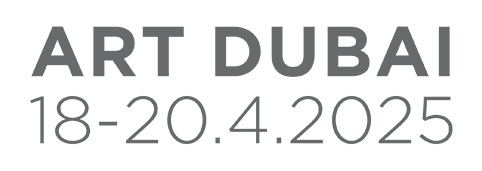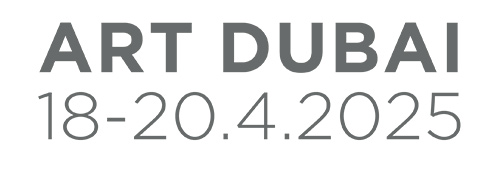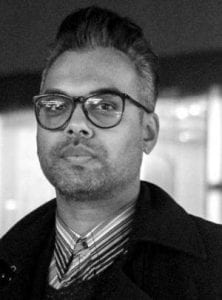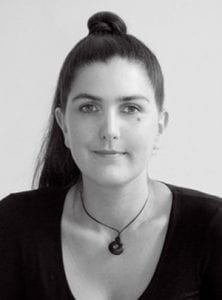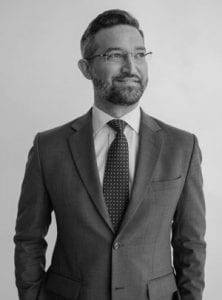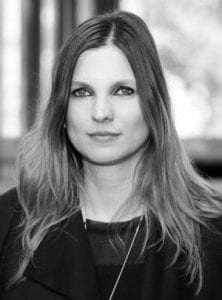Elie Ayache was trained as an engineer at l’École Polytechnique of Paris, he pursued a career of option market-maker on the floor of MATIF (1987-1990) and LIFFE (1990-1995). He then turned to the philosophy of probability (DEA at la Sorbonne) and to the technology of derivative pricing, and co-founded ITO 33, a financial software company, in 1999.
Today, ITO 33 is the leading specialist in the pricing of convertible bonds, in the equity-to-credit problem, and more generally in the calibration and recalibration of volatility surfaces.
Jessica Bland is Head of Research at the Dubai Future Foundation, previously head of the technology futures team at Nesta, a UK foundation.
She works on the governance of emerging technologies – particularly artificial intelligence, synthetic biology and open science. She has also worked at the Royal Society (the UK’s National Academy of Science) and written for the Guardian and the Economist.
Cheryl Chung is the Co-Director of the Executive Education department at the Lee Kuan Yew School of Public Policy, National University of Singapore. She also heads the School’s Strategic Planning department and together with a team, is building the futures research and teaching capabilities at the School with the “Future Ready Singapore” project.
As part of her teaching responsibilities, she curates the Lee Kuan Yew School Course, a core module for new Masters students that asks the big questions of public policy, using Singapore as an illustrative case study.
Sougwen Chung is an artist and (re)searcher based in New York.
Sougwen’s work explores the mark-made-by-hand and the mark-made-by-machine as an approach to understanding the interaction between humans and computers. Her speculative critical practice spans installation, sculpture, still image, drawing, and performance. She is a former research fellow at MIT’s Media Lab and a pioneering E.A.T. Artist in Resident in partnership with New Museum and Bell Labs. She is an inaugural member of NEW INC, the first museum-led art and technology incubator.
Louis-Philippe Demers is a robotics artist based in Singapore, and an Associate Professor at the School of Art, Design and Media at Nanyang Technological University. His career spanning several decades including the conception and production of several large-scale interactive robotic installations, so far realizing more than 375 machines.
He has received six mentions and a distinction at the prestigious Prix Ars Electronica, three prizes at Artificial Life (VIDA), two Helpmann awards, the prize for Interactive Lighting at Lightforms festival, and two jury selections at the Japan Media Art Festival.
Nina Ernst is the Associate Director, Programmes for ArtScience Museum at Marina Bay Sands. Her work at the museum spans public engagement through tours, talks and workshops, performances, films and events, as well as schools programmes, interactive displays and outreach.
Since joining ArtScience Museum, her focus has been on growing the attendance and deepening the engagement for public programmes and visitation from schools.
Wesley Goatley is a sound artist and researcher in Critical Data Aesthetics. Through installations, software artworks, and performance, his work explores the politics and ideologies behind data and networked technologies, and how critical art practice can expand our understanding of them.
His work is exhibited internationally, with recent shows in East Asia, Continental Europe, and North America. He gives regular talks and workshops on the subject of Critical Data Aesthetics, a methodology for the practice of data aestheticisation that he is developing through a PhD scholarship from the University of Sussex Humanities Lab.
Honor Harger is the Executive Director for ArtScience Museum at Marina Bay Sands. A curator from New Zealand, she has a strong interest in artistic uses of technologies and in science as part of culture. Honor brings with her over 15 years of experience of working at the intersection between art, science and technology. She is responsible for charting the overall direction and strategy for ArtScience Museum.
Prior to joining Marina Bay Sands, she was the artistic director of Lighthouse in Brighton, United Kingdom, from 2010 to 2014 where she curated projects which showed the cultural impact of scientific ideas.
David Hsu is a professor of computer science at the National University of Singapore (NUS) and a member of NUS Graduate School for Integrative Sciences & Engineering. He received PhD in computer science from Stanford University. At NUS, he co-founded NUS Advanced Robotics Center and has been serving as the Deputy Director. He held visiting positions at MIT Aeronautics & Astronautics Department and CMU Robotics Institute. He is an IEEE Fellow. Professor Hsu’s research interests span robotics, AI, and computational structural biology. In recent years, he has been working on robot planning and learning under uncertainty and human-robot collaboration. He is currently serving on the editorial board of Journal of Artificial Intelligence Research.
Koo Sengmeng leads alliances and partnerships for AI Singapore and engineers collaborations with glocal entities to further Singapore’s AI ambitions. Prior to AI Singapore, Sengmeng has over a decade of experience in mobile communications and interactive digital media, launching first-of-its-kind solutions for companies such as Nokia, Sony Ericsson and Sony Music Entertainment. Sengmeng joined the Singapore Public Service in 2012, where his team helped shape the billion-dollar Asia Pacific games industry and also launch the IDA Lab On Wheels in 2014 – demystifying frontier technologies such as mixed reality, machine intelligence, and robotics to students and masses. Sengmeng graduated from the National University of Singapore with a bachelor degree in engineering.
Chor Pharn Lee is the Principal Strategist at Centre for Strategic Futures. He has extensive public service experience helming strategic and business development roles. In his current post as Principal Strategist, he supports and advises on CSF’s foresight research agenda, and translation into strategy at various government platforms.
He has also served in the Ministry of Trade and Industry, overseeing strategic foresight and futures thinking to support economic policy analysis, and in a business development role at the China office of the Infocomm Development Authority of Singapore.
Isabel Lewis ( born 1981, Santo Domingo, DR) works on the aesthetics of the experiential creating spaces of sociable encounter between human and nonhuman agents in the format she’s named the hosted occasion. Lewis’ sensorial occasions have been presented internationally, recently at Tate Modern London, Ming Contemporary Art Museum in Shanghai, and Martin Gropius Bau in Berlin.
Lim Sun Sun is Professor of Communication and Technology and Head of Humanities, Arts and Social Sciences at the Singapore University of Technology and Design.
She has researched extensively on the social implications of technology domestication, authoring more than 70, articles, book chapters and books. She serves on the editorial boards of ten journals and has contributed actively to public bodies including the Media Literacy Council and the National Internet Advisory Committee. She has won eight awards for excellent teaching.
Gemma Roig is currently an Assistant Professor at Singapore University of Technology and Design and a research affiliate at MIT. She was postdoctoral fellow at Massachusetts Institute of Technology in the Center for Brains Minds and Machines. Dr Gemma Roig was also affiliated at the Laboratory for Computational and Statistical Learning, which is a collaborative agreement between the Istituto Italiano di Tecnologia and the Massachusetts Institute of Technology.
Her research aim is to build computational models of human vision to understand its underlying principles, and to use those models to build applications of artificial intelligence.
Volker H. Schmidt graduated from the Universities of Marburg, Birmingham and Bielefeld with a Master’s Degree in sociology in 1987. He received a PhD in 1995 at the University of Bremen and a habilitation in 2000 at the University of Mannheim. He spent 1997-1998 as a JFK Memorial Fellow at the Center for European Studies, Harvard University. Professor Schmidt joined the National University of Singapore in 2000. During 2008-2009, he was a Visiting Fellow at the Excellence Cluster “Religion and Politics in Modernity”, University of Münster, at whose Center for Advanced Study in Bioethics he held short-term fellowships. His work focuses on social justice and inequality, social policy, social theory, and globalisation.
Ania Soliman is an interdisciplinary artist and has a drawing-based research practice and is interested in readings of technology from a post-colonial perspective.
Her work was shown at the Drawing Center (NY), the 2010 Whitney Biennial, 15th Istanbul Biennial, the Museum of Modern Art in Salzburg, and Museum of Culture in Basel.
Sara M Watson is a writer and technology critic based in Singapore, and an affiliate of the Berkman Klein Center for Internet and Society at Harvard University.
She writes and speaks about emerging issues in the intersection of technology, culture, and society. Her work appears in The Atlantic, Wired, The Washington Post, Slate, Motherboard, and other publications. She is based in Singapore and tweets @smwat
Qing Wei is currently the National Technology Officer in Microsoft China which allows him to evangelize Microsoft latest technology vision and innovation.
He is an ICT industry veteran who has been working in mobile communication, information technology and smart devices related business for over 25 years in Asia with Microsoft and Motorola. He is also an active public speaker and coach specialized in digital transformation.
Wong Tien Yin is Medical Director of Singapore National Eye Centre, Vice-Dean of Duke-NUS Medical School, National University of Singapore and Deputy Group CEO (Research and Training), SingHealth.
An internationally renowned ophthalmologist specialising in retinal diseases, Professor Wong’s academic and research work has been recognised with numerous awards. He is two-time recipient of the Singapore Translational Research Investigator Award in 2008 and 2014. In 2010, he received the National Outstanding Clinician Scientist Award and the President’s Science Award. He was selected for the 2013 USA Eisenhower Fellowship and received the President’s Technology Award in 2014.
Wong Choon Yue is a Research Fellow of the School of Mechanical and Aerospace Engineering at Nanyang Technological University (NTU Singapore). He received a Master’s Degree in Smart Product Design in 2007 and PhD in Mechanical Engineering in 2013 from NTU. While pursuing his Master’s Degree, he was employed as an engineer at TECH Semiconductor (now Micron Semiconductor Asia).
Dr Wong’s research focuses on interface design and human-robot interaction. His passion lies in the design of innovative and aesthetic robotic systems, and enjoys realising his designs with his own hands and code. Most recently, he developed a humanoid for social robotics called EDGAR.
